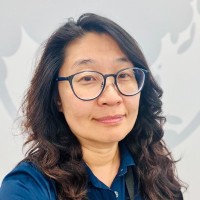 |
Exynos On-device AIDr. Hyukjune Chung |
|
Biography
Dr. Chung currently serves as the Corporate EVP and Head of AP (Application Processor) Development at System LSI, Samsung Electronics Co., Ltd. (2020 ŌĆō Present). In this role, they are responsible for leading SOC (System-on-Chip) development and SOC architecture design. Abstract
In this talk, I will focus on on-device AI computing, and for this, I will present evolution of Exynos AI HW/SW solutions, challenges to support generative AI processing, and systematic approaches to overcome these challenges. |
|
 |
Silicon to Systems 2035: Re-Engineering Engineering for an AI-Driven WorldFrank Schirrmeister |
|
Biography
Frank Schirrmeister is Executive Director, Strategic Programs, System Solutions in Synopsys’ Products & Markets Group. He leads strategic activities across system software and hardware assisted development for industries like automotive, data center and 5G/6G communications, as well as for horizontals like Artificial Intelligence / Machine Learning. Prior to Synopsys, Frank held various senior leadership positions at Arteris, Cadence Design Systems, Imperas, Chipvision, and SICAN Microelectronics, focusing on product marketing and management, solutions, strategic ecosystem partner initiatives, and customer engagement. He holds an MSEE from the Technical University of Berlin and actively participates in cross-industry initiatives as Engineering Program Chair at the ACM/IEEE Design Automation Conference. Abstract
By 2035, our world will be shaped by intelligent systems built upon semiconductor chips and systems of unimaginable complexity. These capabilities will redefine our day-to-day life from healthcare to transportation, but their creation demands a fundamental shift in how we design and engineer them. This presentation will present an outlook on the future of chip and system design, addressing the central question: How must we re-engineer engineering itself to meet the challenges of the next decade and beyond? The presentation will explore the forces shaping the silicon of 2035, from the dominance of software, semiconductor hardware complexity, to the intricacies chip architectures as the industry is pushing the boundaries of processing, memory and interconnect. A key focus will be the dual inflection point of Artificial IntelligenceŌĆöboth as the primary workload driving performance requirements for advanced computing from data centers to edges and as the essential tool for mastering development, verification, validation and implementation complexity of semiconductor devices. Extrapolating lessons from the past decade and insights from industry leaders, this presentation will identify the primary challenges facing our design flows, methodologies, and the engineering workforce. As an outlook for the semiconductor, systems and design automation space, this talk will discuss the necessary evolution of our tools and processes to enable the development of these advanced systems, providing a strategic perspective on how we can collectively build and distribute that future. |
|
 |
The Next-Generation AI Accelerator: Redefining Inference for a Sustainable AI FutureDr. Youngjin Cho |
|
Biography
Youngjin Cho is Vice President of Hardware at FuriosaAI, where he leads the development of SoCs and AI accelerators. Previously, he spent 16 years at Samsung Electronics, serving as Corporate Vice President and leading SSD controller programs and ASIC/SoC architecture. He was a Visiting Scholar at Stanford University in 2017 and holds a Ph.D. in Computer Science from Seoul National University in 2009. His deep expertise in system architecture and silicon design now drives FuriosaAI’s next-generation AI inference chip development. Abstract
As AI inference becomes ubiquitous infrastructure, the industry faces critical challenges in achieving sustainable and cost-effective computing. Current GPU-based solutions, not purpose-built for inference, suffer from poor energy efficiency that threatens AI scalability. This keynote presents TCP (Tensor Contraction Processor), a domain-specific architecture that elevates tensor contraction as the primitive operation. By introducing low-level einsum notation with explicit memory layout and scheduling, TCP enables unprecedented flexibility through software-defined topology and automated compilation, while achieving optimal performance. Our silicon implementation RNGD delivers 512 TFLOPS (FP8) at 150W TDP for air-cooled data centers, demonstrating 4.1├Ś better first token latency and 2.7├Ś improved throughput/watt on LLaMA-7B versus GPUs. This presentation will share our journey from concept to commercial deployment, examining how domain-specific design choices enable sustainable AI infrastructure |
|
 |
The Roadmap to the Future of Computing: Quantum-Centric SupercomputingDr. Hanhee Paik |
|
Biography
Dr. Hanhee Paik is the Director of Quantum Algorithm Centers and Quantum-HPC Partnerships. She is responsible for IBMŌĆÖs scientific collaborations for quantum computing with global technical leaders and scientific partners. Abstract
I would like to share IBMŌĆÖs perspective on the current scientific and technological development of quantum computing capabilities, especially how we are moving onto integrating quantum and classical computing to achieve greater computational capabilities. Nowadays, more users are exploring how to leverage quantum computing as a tool for scientific research or industry applications. In 2023, IBM has demonstrated that with 127-qubit Eagle processor and error mitigation techniques, we can execute quantum circuits outside the reach of classical exact computing methods ŌĆō the beginning of quantum utility. Since then, numerous scientific achievements have been demonstrated using the latest quantum computing systems to unlock new scientific directions we have not been able to access before. I will introduce our recent processor, ŌĆ£HeronŌĆØ, which uses tunable couplers with minimum crosstalk errors that allow 5000+ entangling gates. The Heron processor powers IBM Quantum System Two, our modular, extensible quantum computing architecture for the future of quantum computing. I will describe the updated IBM Quantum Development Roadmap up to 2030+ and share with the vision how we scale our quantum computing systems in the coming years. IBMŌĆÖs goal is to provide powerful, yet simple quantum computing environment for users to easily integrate quantum computing into existing workflows. I will conclude by sharing my vision of quantum-centric supercomputing, the vision we think as the future of computing where the orchestration between classical computing resources such as CPUs and GPUs together with multiple quantum processors, forms a composite architecture that allows for scaling quantum computation to sizes amenable to industry scale problems. |
|